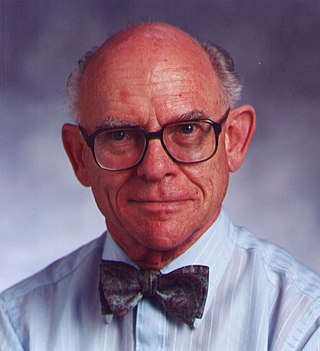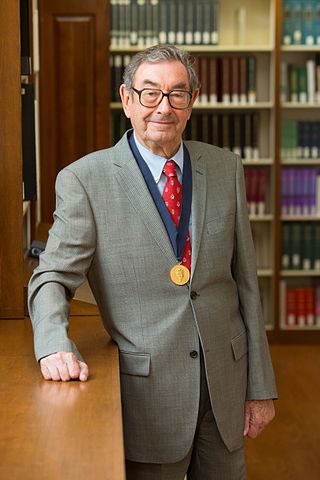External links
| Authority control databases: National |
|---|
The Society of Biological Inorganic Chemistry is a learned society established to advance research and education in the field of biological inorganic chemistry. It holds training courses, workshops and conferences to facilitate exchange of information between scientists involved in the research and teaching of biological inorganic chemistry. It has an official journal, the Journal of Biological Inorganic Chemistry .
The society was founded in 1995, following discussions within the Steering Committee of the European Science Foundation program "The Chemistry of Metals in Biological Systems". The first president was C. David Garner (1995–1998). Later presidents were Elizabeth C. Theil (1998–2000), Alfred X. Trautwein (2000–2002), Harry B. Gray(2002–2004), Fraser Armstrong (2004–2006), and Jose J. G. Moura (2010–2012).

The Royal Society of Chemistry (RSC) is a learned society and professional association in the United Kingdom with the goal of "advancing the chemical sciences". It was formed in 1980 from the amalgamation of the Chemical Society, the Royal Institute of Chemistry, the Faraday Society, and the Society for Analytical Chemistry with a new Royal Charter and the dual role of learned society and professional body. At its inception, the Society had a combined membership of 49,000 in the world.

Sulfur monoxide is an inorganic compound with formula SO. It is only found as a dilute gas phase. When concentrated or condensed, it converts to S2O2 (disulfur dioxide). It has been detected in space but is rarely encountered intact otherwise.
Raymond Allen Dwek CBE FRS FRSC is a scientist at the University of Oxford and co-founder of the biotechnology company Oxford GlycoSciences Ltd.

Frank Albert Cotton FRS was an American chemist. He was the W.T. Doherty-Welch Foundation Chair and Distinguished Professor of Chemistry at Texas A&M University. He authored over 1600 scientific articles. Cotton was recognized for his research on the chemistry of the transition metals.
Tobin Jay Marks is an inorganic chemistry Professor, the Vladimir N. Ipatieff Professor of Catalytic Chemistry, Professor of Material Science and Engineering, Professor of Chemical and Biological Engineering, and Professor of Applied Physics at Northwestern University in Evanston, Illinois. Among the themes of his research are synthetic organo-f-element and early-transition metal organometallic chemistry, polymer chemistry, materials chemistry, homogeneous and heterogeneous catalysis, molecule-based photonic materials, superconductivity, metal-organic chemical vapor deposition, and biological aspects of transition metal chemistry.

Harry Barkus Gray is the Arnold O. Beckman Professor of Chemistry at California Institute of Technology.
Christopher David Garner FRSC FRS is a British retired chemist, whose research work was in the growing field of Biological Inorganic Chemistry. His research primarily focussed on the role of transition metal elements in biological processes, for which he published over 400 original papers and reviews on the topic. His specific interests lie in the roles of Molybdenum and Tungsten as the metal centres in various enzyme cofactors based on the molybdopterin molecule.
John Emsley is a UK popular science writer, broadcaster and academic specialising in chemistry. He researched and lectured at King's College London for 25 years, authoring or co-authoring about 100 papers, and then became Science Writer in Residence at Imperial College London in 1990. From 1997 to 2002 he was Science Writer in Residence at the Department of Chemistry at Cambridge University, England, during which time he started and wrote the newsletter Chem@Cam. He is the author of more than 12 books and several of them have been translated into other languages.

Stephen James Lippard is the Arthur Amos Noyes Emeritus Professor of Chemistry at the Massachusetts Institute of Technology. He is considered one of the founders of bioinorganic chemistry, studying the interactions of nonliving substances such as metals with biological systems. He is also considered a founder of metalloneurochemistry, the study of metal ions and their effects in the brain and nervous system. He has done pioneering work in understanding protein structure and synthesis, the enzymatic functions of methane monooxygenase (MMO), and the mechanisms of cisplatin anticancer drugs. His work has applications for the treatment of cancer, for bioremediation of the environment, and for the development of synthetic methanol-based fuels.
The European Biological Inorganic Chemistry Conference, or EUROBIC, is a biannual conference on Bioinorganic chemistry founded in 1992. The conference is held in Europe but attracts scientists from all over the world. EUROBIC was the result of a merger of the Swiss-Italian SIMBIC conference and the French-German SAMBAS conference. The aim is to create a forum and promote collaboration between scientists in the highly multidisciplinary field of Biological Inorganic Chemistry, ranging from biology to inorganic chemistry.
Edward I. Solomon is the Monroe E. Spaght Professor of Chemistry at Stanford University. He is an elected member of the United States National Academy of Sciences, a Fellow of the American Association for the Advancement of Science, and a Fellow of the American Academy of Arts and Sciences. He has been profiled in the Proceedings of the National Academy of Sciences. He has been a longtime collaborator with many scientists, including his colleague at Stanford University Keith Hodgson for the study of metalloenzyme active sites by x-ray spectroscopy, along with the synthetic chemists Richard H. Holm, Stephen J. Lippard, Lawrence Que Jr. and Kenneth D. Karlin.
Fraser Andrew Armstrong is a professor of chemistry at the University of Oxford and a Fellow of St John's College, Oxford.
Joan Selverstone Valentine is a biological inorganic chemist and biochemist. Valentine's current work examines the role of transition metals, metalloenzymes, and oxidative stress in health. Her foremost expertise is superoxide anion and its functional enzyme superoxide dismutase. Valentine has been a member of the faculty of the University of California, Los Angeles since 1980. She served as Associate Editor of the journal Inorganic Chemistry from 1989 to 1995, and served as Editor-in-Chief of Accounts of Chemical Research from 1994 to 2013. In 2005, she was elected to the National Academy of Sciences.
CatherineJ. Murphy is an American chemist and materials scientist, and is the Larry Faulkner Professor of Chemistry at the University of Illinois at Urbana-Champaign (UIUC). The first woman to serve as the head of the department of chemistry at UIUC, Murphy is known for her work on nanomaterials, specifically the seed-mediated synthesis of gold nanorods of controlled aspect ratio. She is a member of the American Association for the Advancement of Science, National Academy of Sciences, and the American Academy of Arts and Sciences in 2019.

Debbie C. Crans is a Professor of Organic, Inorganic and Biological Chemistry and of Cell and Molecular Biology at Colorado State University, where she also is a Professor Laureate of the College of Natural Sciences. Crans specializes in the fundamental chemistry and biochemistry of drugs, with particular focus on vanadium and other transition metal ions as metals in medicine and investigation of their mechanisms of toxicity.
Govindasamy Mugesh is an Indian inorganic and physical chemist, a professor and the head of the Mugesh Laboratory attached to the department of Inorganic and Physical Chemistry at the Indian Institute of Science. He is known for his studies on the mechanism of thyroid hormone action and is an elected fellow of the Indian Academy of Sciences, Indian National Science Academy, Royal Society of Chemistry and the National Academy of Sciences, India. The Council of Scientific and Industrial Research, the apex agency of the Government of India for scientific research, awarded him the Shanti Swarup Bhatnagar Prize for Science and Technology, one of the highest Indian science awards, in 2012, for his contributions to chemical sciences. In 2019, he was awarded the Infosys Prize in Physical Sciences for his seminal work in the chemical synthesis of small molecules and nanomaterials for biomedical applications.
Kim R. Dunbar is an American inorganic chemist and Distinguished Professor of Chemistry at Texas A&M University. Her research concerns inorganic and coordination chemistry, including molecular magnetism, metals in medicine, supramolecular chemistry Involving anions and anion-pi interactions, and multifunctional materials with organic radicals.
Celine J. Marmion is a Professor of Chemistry at the Royal College of Surgeons in Ireland and President of the Institute of Chemistry of Ireland. She is a Fellow of the Royal Society of Chemistry and the Institute of Chemistry of Ireland. Marmion is involved with the design of new chemotherapeutic drugs.
Maria Arménia Carrondo is a Portuguese scientist specialized in protein crystallography. She was a full professor at the Institute of Chemical and Biological Technology (ITQB) of the NOVA University Lisbon and former president of the Foundation for Science and Technology (FCT), the main funding institution for science in Portugal.